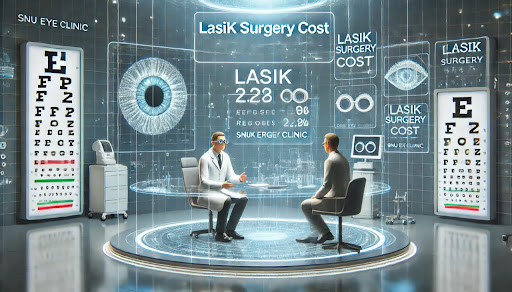Our eyes are the windows to the world, yet they are often neglected in day-to-day health routines. According to leading ophthalmologists, safeguarding your vision doesn’t require drastic measures, but rather consistent care and awareness. From managing screen time to eating a balanced diet, these specialists emphasize simple lifestyle changes that can significantly impact eye health. snu eye clinic In this article, we’ll explore the top expert-recommended tips to protect and enhance your eyesight throughout your life.

- Follow the 20-20-20 Rule for Screen Relief
One of the most common concerns ophthalmologists encounter today is digital eye strain caused by prolonged screen use. Whether it’s working on a computer or scrolling through your phone, your eyes are constantly at work, leading to fatigue, dryness, and blurry vision. The 20-20-20 rule is a simple technique to combat this issue: every 20 minutes, take a 20-second break and look at something 20 feet away. This gives your eye muscles a much-needed break, reducing strain and helping to maintain focus. Coupled with proper lighting and screen positioning, this habit can dramatically ease daily eye fatigue. - Wear Sunglasses Year-Round
Protecting your eyes from ultraviolet (UV) light is not just a summer concern. Ophthalmologists stress that UV exposure contributes to cataracts, macular degeneration, and even eyelid cancer. A good pair of sunglasses should block 100% of both UVA and UVB rays. Even on cloudy days, UV radiation penetrates the atmosphere and can cause damage. Wrap-around styles offer the best coverage, and polarized lenses can reduce glare from reflective surfaces. For individuals who wear prescription glasses, photochromic lenses can be an effective all-in-one solution. - Maintain a Nutrient-Rich Diet
What you eat directly influences your eye health. Leading ophthalmologists recommend a diet high in antioxidants, vitamins, and minerals that support vision and eye function. Leafy greens like spinach and kale are rich in lutein and zeaxanthin—nutrients found in high concentration in the retina. Omega-3 fatty acids found in fish like salmon and tuna promote healthy retinal function and reduce the risk of dry eye syndrome. Vitamin A, C, and E, along with zinc, also play a critical role in preventing age-related vision issues. A well-balanced diet not only supports your eyes but contributes to overall health. - Don’t Skip Regular Eye Exams
Routine eye examinations are essential for detecting issues before they become serious. Ophthalmologists recommend adults get a comprehensive eye exam every 1-2 years, even if they have no noticeable vision problems. Conditions such as glaucoma, diabetic retinopathy, and macular degeneration often progress silently and can cause irreversible damage if not caught early. Children should also receive regular check-ups to ensure healthy vision development, as undiagnosed problems can affect their learning and development. Early detection through exams is one of the most effective strategies for preserving long-term vision. - Practice Proper Contact Lens Hygiene
If you wear contact lenses, how you care for them can make or break your eye health. Leading experts warn that improper lens hygiene can lead to infections, corneal ulcers, and in severe cases, vision loss. Always wash your hands thoroughly before handling lenses, use fresh solution every time you store them, and never sleep in contacts unless they are specifically approved for overnight wear. Additionally, avoid using tap water to clean lenses, and make sure to replace your contact case regularly. These small practices significantly reduce the risk of contamination and keep your eyes safe. - Manage Chronic Conditions and Lifestyle Risks
Eye health is often linked to other systemic conditions such as diabetes and high blood pressure. Ophthalmologists highlight the importance of managing these conditions, as they can lead to serious eye complications like diabetic retinopathy or hypertensive retinopathy. Smoking is another major risk factor, increasing the chances of cataracts and macular degeneration. Quitting smoking, exercising regularly, and maintaining a healthy weight can drastically reduce the risk of vision-threatening diseases. If you have a family history of eye diseases, you should be even more proactive in monitoring your eye health.
Conclusion
Healthy vision is a vital part of your overall well-being, and protecting it requires a blend of awareness, prevention, and action. The advice from ophthalmologists is clear: take regular breaks from screens, eat smart, wear UV-blocking sunglasses, maintain regular eye check-ups, handle contacts responsibly, and manage chronic health risks. These simple yet effective tips can help you maintain sharp, healthy vision for years to come. As always, if you notice any changes in your vision, seek professional guidance promptly—your eyes deserve nothing less than the best care.
